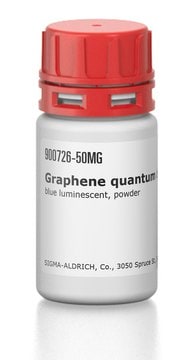776793
InP/ZnS quantum dots
stabilized with oleylamine ligands, fluorescence λem 560 nm, 5 mg/mL in toluene
Sinonimo/i:
Cadmium free core shell quantum dots, Cadmium free quantum dots, Core/Shell heavy metal free quantum dots, Fluorescent nanocrystals
About This Item
Prodotti consigliati
Livello qualitativo
Stato
liquid
Concentrazione
5 mg/mL in toluene
Fluorescenza
FWHM <85 nm, quantum yield ~25%
λem 560 nm
Temperatura di conservazione
2-8°C
Cerchi prodotti simili? Visita Guida al confronto tra prodotti
Applicazioni
and the corresponding regulations worldwide makes these InP/ZnS quantum dots as more desirable alternatives for consumer applications.
Altre note
Avvertenze
Danger
Indicazioni di pericolo
Consigli di prudenza
Classi di pericolo
Aquatic Chronic 3 - Asp. Tox. 1 - Carc. 1B - Flam. Liq. 2 - Repr. 2 - Skin Irrit. 2 - STOT RE 1 - STOT RE 2 - STOT SE 3
Organi bersaglio
Central nervous system, Lungs, Respiratory system
Classe di pericolosità dell'acqua (WGK)
WGK 3
Punto d’infiammabilità (°F)
closed cup
Punto d’infiammabilità (°C)
closed cup
Scegli una delle versioni più recenti:
Possiedi già questo prodotto?
I documenti relativi ai prodotti acquistati recentemente sono disponibili nell’Archivio dei documenti.
Articoli
Since the first report of the low-cost dye-sensitized solar cell (DSSC) in 1991 by Gratzel and his coworker,1 dye-sensitized solar cells (DSSC) has been regarded as one of the most promising photovoltaic technologies because of their transparent and colorful characteristics, as well as low cost.
Professor Sharma and colleagues review the synthesis and applications of this novel material. This includes a discussion of the unique properties of quantum dots and their suitability for solar cell applications, along with common synthesis techniques used to develop these materials.
Professor Xiaohu Gao (University of Washington, USA) provides a overview of recent quantum dot (QD) advancements and their potential for advancing bioassay and bioimaging technologies.
Synthesis of Halide Perovskite Quantum Dots for Display Applications
Il team dei nostri ricercatori vanta grande esperienza in tutte le aree della ricerca quali Life Science, scienza dei materiali, sintesi chimica, cromatografia, discipline analitiche, ecc..
Contatta l'Assistenza Tecnica.






